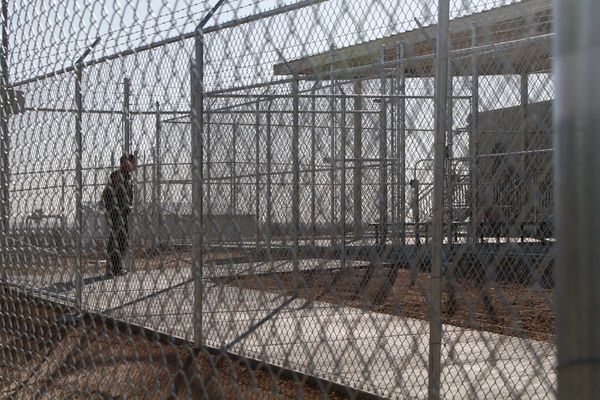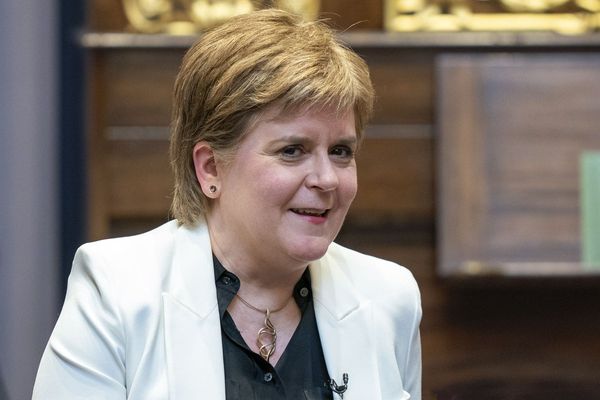
The Biden administration is in talks with economic powerhouses in Asia to gain their support for severe sanctions and export control packages against Russia as tensions mount over Russian troops deploying to breakaway regions in eastern Ukraine.
Washington has so far received support from Singapore, Japan and Taiwan for plans to implement restrictive export controls on Russia, three US sources tell Foreign Policy, part of a broader sanctions package aimed at crushing Russia’s economy and technology sectors should the Kremlin move forward with plans to launch a full-fledged invasion of Ukraine.
The three Asian countries are major producers of semiconductors, computer chips and other high-end technological exports that Russia is reliant on.
These latest developments, described to Foreign Policy by three people who are familiar with the matter, demonstrate the global ripple effect of implementing massive sanctions programs targeting Moscow. The knock-on impacts of any economic reprisals against Russia would extend well beyond Europe’s borders.
The plan follows a relatively new playbook in the world of economic warfare, one that US officials most recently used to target a Chinese telecommunications giant, Huawei. The Foreign Direct Product Rule, as the policy is known, extends US jurisdiction over products made with US software or technology, even if those products are made abroad by foreign companies without other ties to the US. If implemented, it could hit many sectors of Russia’s economy in a way traditional sanctions might not — blocking Russia from importing technology critical to its oil and gas sectors, maritime, defence and civil aviation industries, and even the import of cars, smartphones and other consumer electronics.
“All semiconductors on the planet are made with US software or tools in part, so this will catch any destined to Russia,” Kevin Wolf, a former senior Commerce Department official now at the Akin Gump law firm, told Foreign Policy in an email. “Unlike sanctions, jurisdiction attaches to the item — and the nationality of the companies involved is irrelevant.”
The embassies of Japan and Singapore and the diplomatic office of Taiwan in Washington did not respond to a request for comment. The State Department and National Security Council did not respond to requests for comment.
Russian President Vladimir Putin has declared his country would recognise breakaway regions in eastern Ukraine held by Russian-backed separatists and announced the deployment of what he described as Russian peacekeepers to the so-called Donetsk and Luhansk People’s Republics.
The US and European Union immediately condemned the move and said those involved in the decision would be sanctioned. The White House announced it would block US trade with the breakaway Ukrainian regions and prepare sanctions against people operating in those areas.
Those are separate from the sanctions package the US is preparing should Russia launch a full-fledged invasion of Ukraine. Senior White House officials have said the Biden administration would unveil more sanctions, spurred in part by its allies in Congress urging a harsher response.
Critics of the administration, including Republican lawmakers, argue President Joe Biden should have moved forward with tougher sanctions before Putin’s move on the breakaway Ukrainian regions. They also characterised the initial sanctions against those separatist regions as weak and largely symbolic, given there is virtually no trade between them and the US.
Supporters of the administration’s policies say Washington needs to keep the toughest sanctions in reserve to deter a wider Russian invasion. Pulling the trigger too soon, they argue, could convince Russia to launch more military operations against Ukraine, believing it has nothing more to lose.
“You can’t use up all your ammo now,” said Brian O’Toole, a former Treasury Department official and sanctions expert at the Atlantic Council, a think tank. “If you roll out all the sanctions now … you lose your deterrent effect, and for Putin you almost make it damned if he does, damned if he doesn’t.
“And that’s not a place you want Putin to be. The guy’s a gambler to begin with; you don’t want to give him a reason to roll the dice more.”
Russia has amassed as many as 190,000 troops near Ukraine’s border, including troops stationed in western Russia and neighbouring Belarus. US officials fear that even with Russia deploying so-called peacekeepers to the breakaway regions, Putin might not stop there and still launch an invasion deeper into Ukraine.
The extension of American export controls over foreign products represents the latest method that US officials are testing to ensure any planned reprisals over an invasion against the oligarchs and government elites around Putin pack a punch. That effort is made more difficult by the fact that Russia has become inured to the impact of Western sanctions for the better part of a decade, after its illegal annexation of Crimea from Ukraine in 2014.
Sanctions experts said that Russia has long been steeling itself against new Western sanctions while preparing for action against Ukraine by stacking foreign currency reserves and building internal industries. In a recent long-winded speech, Putin insisted that the US-led sanctions were an effort to hold Moscow back, with no justification.
“The purpose is single: to keep Russia behind, to prevent it from developing,” he said. “And they will do it before even without any formal pretext. Just because we exist.”
Washington has made clear it would not deploy troops to Ukraine, and it is relying instead on threats of punishing economic reprisals to deter Putin from launching an invasion beyond the Donbass region.
Against the backdrop of the drama playing out on Ukraine’s borders, US sources told Foreign Policy some of their Asian allies worry that China could adopt Russia’s playbook for any eventual plans to take Taiwan by force. That has been reflected inside the Biden administration, where top officials, such as Secretary of State Antony Blinken, are already trying to figure out lessons learnt from the Ukraine crisis to create a possible road map if China invades Taiwan.
The Biden administration is still working out the particulars of sanctioning Putin’s inner circle, most of whom have finances spread out around the globe.
British Prime Minister Boris Johnson said on Sunday that the US and Britain planned to cut off Russian companies’ access to US dollars and British pounds if an invasion goes ahead. US and European officials have also drafted plans to target Russia’s large, medium and small banks.
The British government announced plans on Tuesday to sanction five Russian banks and three Russian oligarchs, all of whom were already on US sanctions lists. The US has indicated it would not cut off Russia from the Society for Worldwide Interbank Financial Telecommunication (SWIFT) messaging system, considered a backbone of the global financial system.
Germany, meanwhile, announced plans to stop certification of the controversial Nord Stream 2 gas pipeline, which would allow Russia to bypass Ukraine as a transit hub for its gas supplies and instead pipe gas across the Baltic Sea into Germany. The German government has faced withering criticism from US lawmakers and eastern European officials over Nord Stream 2, amid concerns that Putin could wield the pipeline for geopolitical influence over Europe, which is still reliant on Russian gas imports.
Export control restrictions could severely impact European firms that trade with Russia as well. Originally used to protect American products that could potentially have dual-use or military applications, the Biden plan could see them used more in the vein of US sanctions, using multiple controls on similar sectors to catch outbound commercial products, something most other countries have never done before.
Wolf said that companies are bracing for some of the most extensive and complicated export controls ever put forward by the US government if Washington moves forward with its toughest sanctions package — and other countries will have to catch up to stop Russian products.
“It’s kind of like the Swiss cheese approach,” Wolf said. “The Europeans and the other [countries] don’t really have either the legal authority or the history of these types of extraterritorial and novel controls … The US controls will, by definition, be vastly broader in scope than anything any other ally will do.”







